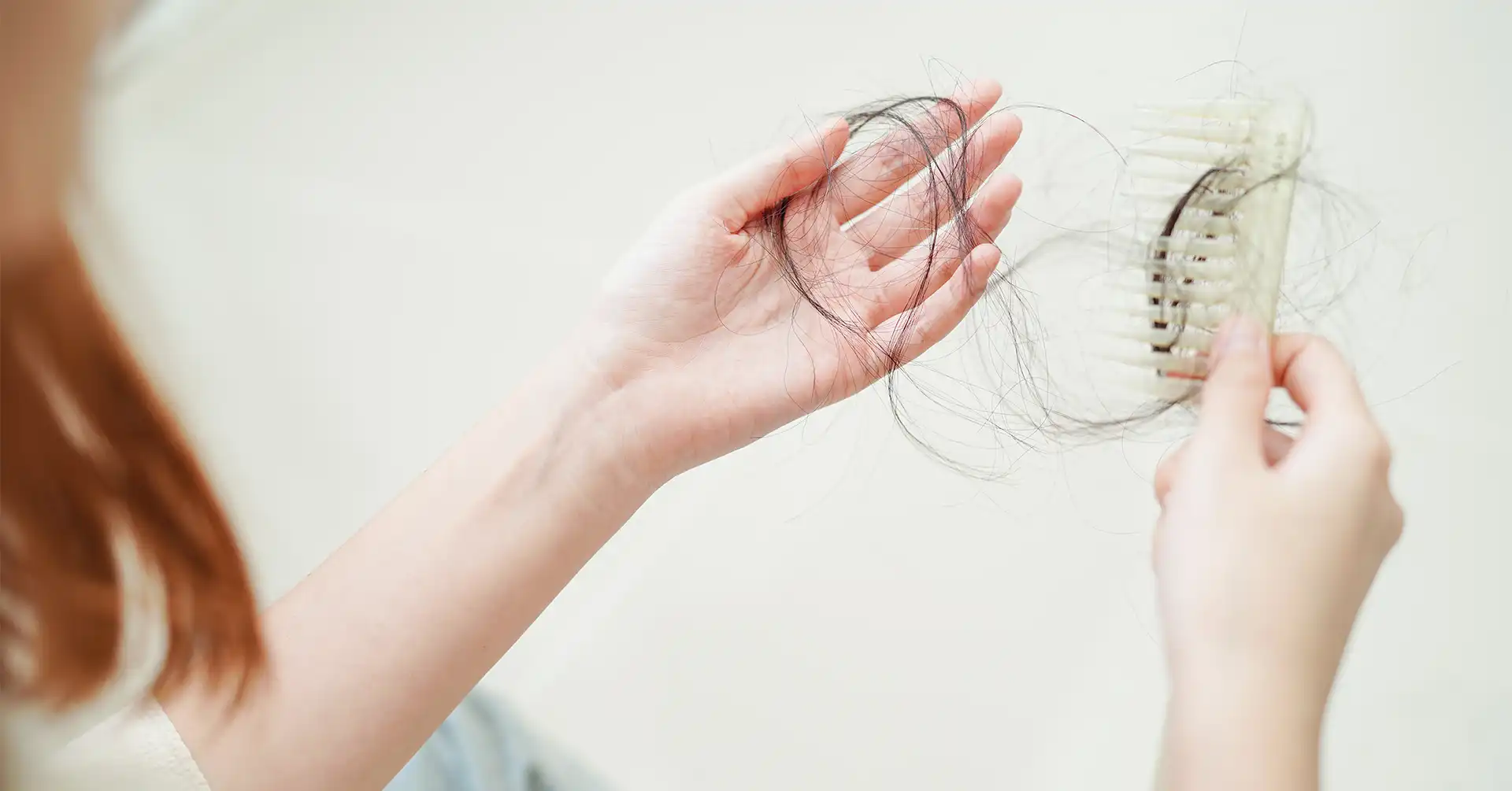Our body’s thyroid gland, located in the neck, plays a crucial role in regulating various bodily functions. It produces hormones that control metabolism, energy levels, and even body temperature. Maintaining a healthy thyroid is vital for overall well-being. When the thyroid functions optimally, it ensures a harmonious balance in our body.
The Link Between Thyroid Dysfunction and Hair Loss
Thyroid dysfunction, whether it’s hypothyroidism (underactive thyroid) or hyperthyroidism (overactive thyroid), can significantly impact hair health. When the thyroid gland doesn’t produce enough hormones (hypothyroidism) or produces an excess (hyperthyroidism), it disturbs the balance within the body. This hormonal imbalance, in turn, affects the hair growth cycle.
How Thyroid Imbalance Leads to Hair Loss
When we talk about Thyroid Hair Loss, it’s crucial to understand how an imbalance in the thyroid gland, a small butterfly-shaped organ located in the neck, can impact our hair health. The thyroid gland plays a vital role in regulating various body functions, including metabolism and growth. When this gland doesn’t function properly, it can lead to hair loss issues.
Overview of Thyroid Gland Function
The thyroid gland produces hormones, primarily T3 (triiodothyronine) and T4 (thyroxine), which control metabolism – the process by which our bodies convert food into energy. These hormones ensure that our cells function correctly, including the hair follicles. Proper thyroid function is essential for maintaining healthy hair growth.
Impact of Hypothyroidism on Hair Growth
Hypothyroidism occurs when the thyroid gland doesn’t produce enough hormones. In this condition, hair growth slows down significantly. Hair may become thin, dry, and brittle. It might also lead to hair loss, causing noticeable thinning or bald patches. Hypothyroidism affects the hair growth cycle, leading to a decrease in the number of hair strands growing at any given time.
Effects of Hyperthyroidism on Hair
On the other hand, hyperthyroidism happens when the thyroid gland produces an excess of hormones. In this condition, hair loss can occur as well. However, the hair loss linked to hyperthyroidism tends to be different. Hair becomes finer in texture, and there might be excessive shedding. Hair may also become more prone to breakage due to the overactive thyroid gland affecting the hair structure.
Identifying Thyroid-Related Hair Loss
Thyroid Hair Loss: A Common Concern
People experiencing excessive hair loss often wonder if their thyroid could be the culprit. Understanding the signs and symptoms associated with thyroid-induced hair loss is the first step toward addressing this concern effectively.
Signs and Symptoms of Thyroid-Induced Hair Loss
Thyroid hair loss manifests itself in various ways. Individuals might notice a sudden increase in hair shedding, thinning of hair on the scalp, or even bald patches. Dry and brittle hair, as well as changes in hair texture, are common signs too. Feeling unusually fatigued, gaining or losing weight unexpectedly, and experiencing mood swings are other indicators. Recognizing these signs can help pinpoint thyroid-related hair loss early on.
Diagnosing Thyroid Disorders
Consulting a Healthcare Professional
When experiencing hair loss, it’s crucial to consult a healthcare provider who can conduct a thorough evaluation. The healthcare professional will inquire about the symptoms and conduct a physical examination. They might ask about family history and overall health. If thyroid dysfunction is suspected, blood tests measuring thyroid hormone levels, such as TSH (Thyroid Stimulating Hormone) and T4 (Thyroxine), are often performed.
Medical Tests and Examinations
Medical tests play a vital role in confirming thyroid disorders. A simple blood test provides valuable insights into thyroid hormone levels. Elevated TSH levels often indicate hypothyroidism, whereas decreased TSH levels can suggest hyperthyroidism. Sometimes, additional tests like thyroid ultrasound or a thyroid scan may be conducted for a comprehensive diagnosis. These examinations help healthcare professionals understand the underlying thyroid condition, enabling appropriate treatment measures.
Identifying Thyroid-Related Hair Loss
When it comes to understanding and addressing Thyroid Hair Loss, it’s crucial to recognize the signs and symptoms associated with this condition. By being aware of these indicators, individuals can take proactive steps toward seeking appropriate medical help. Here’s a breakdown of how to identify thyroid-induced hair loss:
Signs and Symptoms of Thyroid-Induced Hair Loss
Thyroid Hair Loss often manifests itself through noticeable changes in hair quality and volume. Keep an eye out for the following signs:
- Excessive Hair Shedding: If you find an unusually large amount of hair on your pillow, hairbrush, or in the shower drain, it might indicate a problem.
- Thinning Hair: Thyroid-related hair loss can cause your hair to become thinner, especially around the crown of your head.
- Dry and Brittle Hair: The hair might lose its natural shine and become dry and brittle, making it prone to breakage.
- Changes in Hair Texture: Your hair might become coarse or fine, losing its normal texture.
- Bald Spots: In severe cases, you might notice bald patches or areas with significantly reduced hair growth.
Diagnosing Thyroid Disorders
If you suspect you might be experiencing Thyroid Hair Loss, it’s essential to consult a healthcare professional. They can conduct a thorough evaluation to diagnose any underlying thyroid disorders. Here’s how doctors diagnose thyroid-related issues:
- Medical History: Your doctor will ask about your symptoms, medical history, and family history of thyroid disorders to understand the context.
- Physical Examination: A physical examination, including a check of your hair and nails, can provide valuable insights into your overall health.
- Blood Tests: Doctors often order blood tests to measure thyroid hormone levels, including TSH (Thyroid Stimulating Hormone), T3 (Triiodothyronine), and T4 (Thyroxine) to assess thyroid function.
- Ultrasound: In some cases, an ultrasound of the thyroid gland might be performed to identify any abnormalities or inflammation.
- Biopsy (if necessary): If a lump or nodule is detected in the thyroid gland, a biopsy might be performed to rule out thyroid cancer.
Thyroid Medications: Rebalancing the System
When dealing with Thyroid Hair Loss, one of the primary steps towards regrowth involves medication. Thyroid medications are specifically designed to regulate thyroid hormone levels in your body. By taking these medications as prescribed by your healthcare provider, you can effectively balance your thyroid hormones. As a result, this helps in reducing hair loss and promotes the growth of new, healthy hair follicles.
Lifestyle Changes: A Holistic Approach
Beyond medications, lifestyle modifications play a crucial role in managing Thyroid Hair Loss. Adopting a balanced diet rich in essential nutrients, regular exercise, and sufficient sleep can significantly contribute to improving overall thyroid function. A healthy lifestyle enhances blood circulation, ensuring that the hair follicles receive an adequate supply of nutrients and oxygen. This, in turn, fosters hair growth and strengthens existing hair.
Alternative Therapies and Supplements: Exploring Natural Aids
In addition to conventional treatments, exploring alternative therapies and supplements can complement your efforts in combating Thyroid Hair Loss. Some individuals find relief through therapies such as acupuncture or yoga, which help in reducing stress, a common trigger for hair loss. Additionally, there are various supplements available in the market, like biotin, zinc, and iron, that are known to support hair health. However, it’s essential to consult your healthcare provider before incorporating any new supplements into your routine to ensure they are safe and appropriate for your specific condition.
Boosting Hair Regrowth Naturally
Thyroid Hair Loss can be distressing, but there are natural ways to encourage regrowth and improve the overall health of your hair. By incorporating specific lifestyle changes and natural remedies, you can support your body in regaining its natural hair growth cycle.
Nutritional Support for Hair Health
Proper nutrition plays a crucial role in promoting hair growth. Ensure your diet includes essential vitamins and minerals such as Vitamin A, Vitamin E, biotin, and zinc. These nutrients help in strengthening hair follicles and preventing further hair loss. Include a variety of fruits, vegetables, lean proteins, and whole grains in your meals to provide your body with the necessary building blocks for healthy hair.
Exercise and Stress Management Techniques
Regular physical activity not only improves overall health but also enhances blood circulation, including to your scalp. Engaging in exercises like walking, jogging, or yoga can increase blood flow to hair follicles, promoting hair growth. Additionally, stress can exacerbate hair loss, so managing stress through relaxation techniques like meditation, deep breathing, or hobbies can help maintain a healthy hair environment.
Herbal Remedies and Natural Treatments
Several herbs and natural treatments have been traditionally used to encourage hair growth. One popular option is aloe vera, which contains enzymes that promote hair follicle health. You can apply aloe vera gel directly to your scalp to soothe and nourish it. Another herb, saw palmetto, is believed to block an enzyme that leads to hair loss. Ginseng, rosemary oil, and lavender oil are also known for their potential to stimulate hair growth and improve hair texture.
Conclusion
Dealing with Thyroid Hair Loss can be challenging, but it’s not an irreversible situation. By understanding the underlying causes, seeking appropriate medical advice, and adopting a holistic approach that includes proper nutrition, regular exercise, and natural remedies, individuals can significantly improve their hair health and regain confidence. Remember, every person’s journey to recovery is unique, so be patient, stay consistent with your efforts, and trust in the process. With the right strategies and determination, it’s possible to overcome Thyroid Hair Loss and enjoy a healthy, vibrant mane once again.
Also Read:
Levothyroxine Side Effects: Understanding Risks and Benefits






